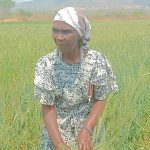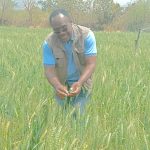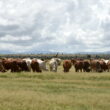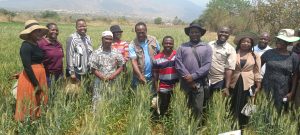 By Conrad Mwanawashe, recently in Nyanga
By Conrad Mwanawashe, recently in Nyanga
The Technologies for African Agricultural Transformation (TAAT), a flagship program of the African Development Bank’s (AFDB) Feed Africa strategy aims to double wheat productivity by providing over 40 million African smallholder farmers with proven technologies amid various factors such as conflict, climate change, pests and diseases outbreaks.
The TAAT programme is being spearheaded by the Department of Research and Specialist Services (DR&SS) under the Ministry of Lands, Agriculture, Water, Fisheries and Rural Development.
Wheat production in Zimbabwe has been on an upward trend since 2022. In 2024, the country achieved a record-breaking wheat harvest exceeding 550 000 metric tons, with an average yield per hectare ranging from 4.2 to 4.6 tons.
These unprecedented yields were achieved through the involvement and participation of smallholder farmers from various irrigation schemes dotted around the country, according to Washington Mubvekeri, Director, Crop Research.
The directorate held a wheat field day in Nyanga recently to celebrate a remarkable achievement in agricultural innovation and progress in wheat seed production under the theme: “Increasing wheat production through climate-resilient and productivity-increasing technologies.
 “This field day comes at an opportune time in which the government of Zimbabwe’s thrust is now on wheat-based food security. I commend the programme for its tireless efforts in promoting sustainable agricultural practices and improving the livelihoods of smallholder farmers.
“This field day comes at an opportune time in which the government of Zimbabwe’s thrust is now on wheat-based food security. I commend the programme for its tireless efforts in promoting sustainable agricultural practices and improving the livelihoods of smallholder farmers.
“The programme’s dedication to enhancing wheat production and productivity is truly commendable. Our target for Zimbabwe under TAAT II is to increase farmers’ access to improved wheat varieties which are heat and drought tolerant as well as high yielding and disease resistant.
“We are expected to produce at least 150 Mt of Early Generation Seed by the year 2025,” said Mubvekeri.
“This can only be achieved with the involvement of smallholder farmers particularly women and youths, who are the drivers of agricultural production in Zimbabwe.
“As such, this programme takes cognizance that women and youth take center stage in the decision-making process, access and utilization of monetary benefits from agricultural enterprises.”
Host farmer, Gogo Cathrine Guta, 81, was upbeat about the benefits she has derived from the project.
“I’m encouraging young women to take up wheat farming under the TAAT-wheat project. Our role now is to pass on our experiences to younger generations,” said Gogo Guta.
TAAT is funded through a grant from the African Development Bank and is implemented by the International Institute of Tropical Agriculture (IITA) in close collaboration with other centers of the Consultative Group for International Agricultural Research (CGIAR) and specialized institutions such as the African Agricultural Technology Foundation (AATF), the Forum for Agricultural Research in Africa (FARA) and the International Fertilizer Development Center (IFDC) and others.
This loan program is intended to unlock Africa’s agricultural potential and boost job creation with a view to diversifying African economies and to better meet the Strategic Development Goals related to poverty reduction and ending hunger and malnutrition.
The programme is aimed at modernizing African agriculture through the advancement of agricultural technology in a way that improves the business of agriculture across Africa, thus raising agricultural productivity, mitigating risks and promoting sustainable enterprise diversification.
The TAAT-Wheat project is also facilitating the involvement of schools in wheat production and value-addition activities in Zimbabwe.
One such institution, SOS Hermann Gmeinner High School in Bindura District, faced challenges in providing quality agricultural education and nutrition to its students and staff.
The introduction of the TAAT-Wheat project marked a transformative journey for the school, allowing it to leverage Early Generation Seed (EGS) production and value-addition activities.
In 2024, the school cultivated approximately 2.5 hectares, yielding an impressive 12 MT of foundation seed.
The school received improved high-yielding, disease-resistant, and heat-tolerant wheat seed varieties and received training on EGS production and value addition.
Additionally, the project introduced value-added activities, including milling and baking, enhancing the school’s agricultural program.
The Food Science Department has been capacitated to produce various value-added wheat products, such as scones, cupcakes, Chelsea buns, Swedish tea rings, and gingerbread, which are sold at the school.
The impact of the TAAT-Wheat project on Hermann Gmeinner High School has been profound, evidenced by increased income from the sale of wheat-based value-added products.
Agricultural production, particularly wheat seed production, has been successfully integrated into the school’s curriculum, providing students with practical skills and knowledge. Consequently, the school has become a hub for agricultural innovation in the community.
Tinashe Dube, a 28-year-old youth farmer from Rupike irrigation scheme, a holder of a degree in agriculture, was fortunate to be selected by the TAAT-Wheat team, received training on wheat production, value addition, marketing and entrepreneurship.
Dube accessed high-quality wheat seeds, fertilizers, and other inputs, which enabled him to put his 1-hectare piece of land to full use and since then he has been an outstanding farmer across all the Innovation Platforms since the inception of the TAAT-wheat project in Zimbabwe producing above the national average wheat yields of 3.5 tonnes/Ha.
Another beneficiary of the TAAT wheat project is Peter Tovera, 56, from Jombe Irrigation Scheme in Mutasa district.
Before the TAAT-Wheat project, Tovera struggled to support his family of five due to a physical disability.
Tovera was capacitated with accessibility agricultural modifications including raised beds for easier access for planting, weeding and harvesting; specialised training on conservation agriculture, soil management and wheat cultivation; seeds and inputs of high-yielding wheat seed, fertilizers and pesticides and mentorship including regular field visits and guidance from project experts.
As a result of this coordinated approach, Tovera saw a 50% increase in wheat yield, enhanced food security and has become a confident and independent farmer who is now an inspiration to o his community.
The project also helped him to fight social stigma through supporting him with quality inputs and training to overcome social exclusion and gain respect in the community.











